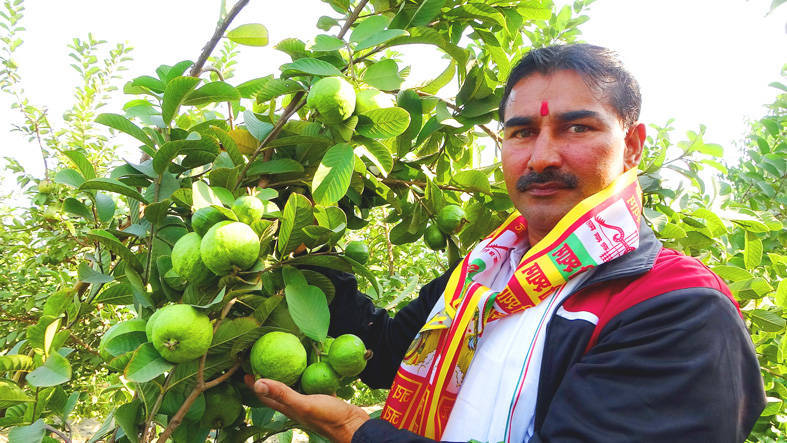《TAIPEI TIMES》 Indian teller wins big with bet on Taiwanese guavas

Indian farmer Kapil Sharma poses with his guava trees in Shahzadpur village, India, in an undated photograph. Photo: CNA
/ Staff writer, with CNA
In November 2019, Indian Kapil Sharma would not have known that he would share a bond with Taiwan because of its guavas.
Laid off from his job as a bank teller during the COVID-19 pandemic, Sharma returned to his home village of Shahijadpur, near Sonipat City north of New Delhi, where he turned his life around by growing Taiwanese guavas.
Unlike most local farmers who planted water-consuming crops like wheat or rice, Sharma visited a biotech company before deciding what to grow. There he saw Taiwanese guava tree saplings, which appealed to him because they consume less water, and a lack of stable water supply can be a problem during the long summer months in India, where the temperature often rises above 40°C.
Sharma bought 550 saplings at 160 rupees (US$1.94) each and the company provided on-site training. He planted different types of guava trees in his 0.4 hectare orchard, including guavas with white flesh and another variety with pink flesh.
About eight months later, Sharma had his first harvest of guavas that earned him about 55,000 rupees.
The pink guavas sold particularly well, Sharma told the Central News Agency (CNA).
They were so popular that demand soon outstripped supply, he said.
This was just the beginning, he added.
With the second harvest, Sharma earned more than 100,000 rupees and decided he was not going back to working as a bank teller.
“Taiwanese guavas changed my life,” he said, adding that the story might have been different if he had chosen another crop.
Taiwanese guavas stand out from other varieties because ripened fruits do not fall from the branches easily, and even when they do, they can be used to make vinegar, which fetches a good price, Sharma said.
Everyone in his village has heard about Taiwanese guavas, he added.
In addition to the rich soil, organic fertilizer was one of the secrets of Sharma’s success.
“I didn’t want my customers to take in the toxic stuff,” said Sharma, who used marigold flowers and plastic bottles to keep fruit flies at bay.
Following the success of Taiwanese guavas, Sharma expanded his business by planting sugarcane and lemons, and started keeping bees. His methods of organic farming has made him a role model in the local community.
In addition to appearing on local media as a model entrepreneur, Sharma also attracted the attention of Rakesh Kumar, a local official at the Indian Ministry of Agriculture and Farmers Welfare.
Kumar told CNA that he welcomed Taiwanese experts instructing local farmers on crop cultivation.
Sharma’s story became more widely known after Manoj Kumar Panigrahi, an Indian assistant professor who studied in Taiwan, wrote an article in Chinese and English detailing the farmer’s experience with Taiwanese guavas.
Panigrahi said Sharma asked him “to humbly share with the people of Taiwan that he is thankful for what Taiwan has given him indirectly and it changed his life.”
When asked whether he would like to visit Taiwan and learn more about the country’s farming techniques, Sharma did not hesitate.
“I want to go to Taiwan so much. A huge part of my success can be attributed to Taiwan. I want to go there and kiss the land,” Sharma said.
新聞來源:TAIPEI TIMES











